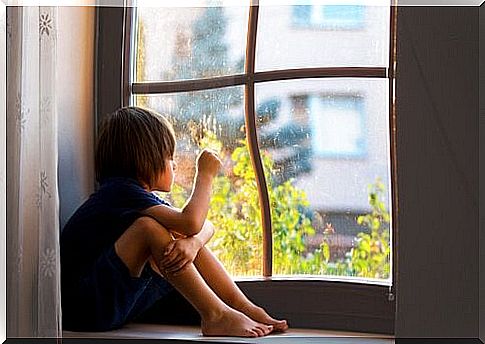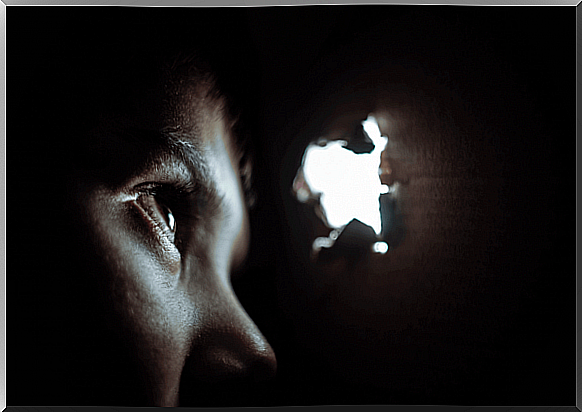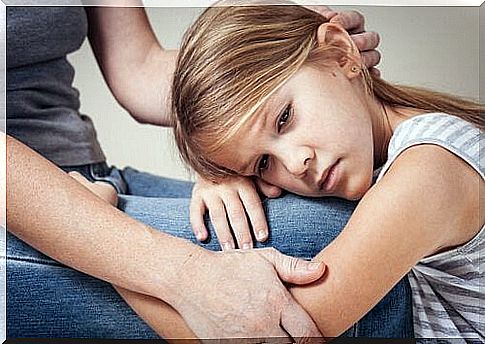Separation Anxiety: Why Bonding Is Good For Children

Separation anxiety can happen to any child and is capable of greatly affecting their daily life. We can all imagine what kind of problems anxiety creates in adults, right? Not only for mental health, but also on a physical level.
And don’t we all agree that children are much less able to regulate their emotions ?
The truth, unfortunately, is that children can get stuck in certain emotional states of being that turn their childhood into a sad time. But the exact opposite can also occur.
One of the truths children must learn is that the people who are important to them will not leave them forever if they go away for a while.
What is separation anxiety?
Separation anxiety is the fear children feel when they are separated from their parents or the people they are most attached to. It is normal for this emotion to appear in children who are very young, but it is also normal for the emotion to disappear quite quickly.
And this is because they come to see these temporary separations as normal when they find that their parents actually come back every time they leave. They no longer experience it as abandonment, only a temporary absence. So when does it become a problem?

Separation anxiety becomes harmful when the anxiety is very intense or when the separation is not normalized. Ultimately, it can become a pathology: separation anxiety disorder.
Diagnostic Criteria for Separation Anxiety
To be diagnosed with separation anxiety, the child must show signs of at least three of these symptoms:
- Excessive and chronic discomfort when separated from his home or the people he is most attached to.
- Refusing to sleep anywhere other than home or somewhere that is not around someone he is very attached to.
- When the child is excessively or constantly worried about the possibility of losing the people he is most attached to. Or the fear that something will happen to these people, such as illness, injury, a natural disaster or death.
- The child is excessively and constantly worried about the possibility that something will separate him from a person he is attached to. (Such as getting lost, being kidnapped, having an accident, or getting sick.)
- Constantly refusing to go out, be it far from home, to school, work or any other place. All out of fear of divorce.
- Constantly or excessively afraid of being alone or without the people to whom it is most attached, at home or elsewhere.
- Recurring nightmares about divorce.
- Recurrent complaints of physical symptoms when experiencing or feeling a separation coming. Examples are headache, abdominal pain, nausea and vomiting.
In addition, the fear and avoidance must be constant and last at least four weeks or more. Therefore, it can greatly affect the lives of children.
It results in immense discomfort for the children who experience it. In fact, it’s not just the children who suffer. The adults also suffer when they see that their child is having so much trouble with something.

What are the causes of separation anxiety?
Separation anxiety can cause social isolation, poor academic performance, and other psychological and emotional problems. But that’s not all.
It has also been found to cause sleep problems and conflict between family members. Therefore, it is important to know which factors play a role in children who develop problems with divorce.
For starters, it is harmful for children to be with their parents all the time. That doesn’t mean parents shouldn’t spend time with their kids. However, it does mean that there must be times when the child and the child’s parents are not together. Why?
Because if there are never moments when the parents and the child are not together, the child cannot get used to this. And then it will probably overreact when the divorce is inevitable.
To put it another way, a child will only develop problems with separation if given many opportunities to develop problems with it. Usually it’s best to start with short absences and then extend them.
Also, unexpected or traumatic situations can affect the child’s anxiety or cause him to deteriorate emotionally. For example, going to school, going to the hospital or the death of a family member.
How Parents Can Help
Finally, there are unfortunately also parents who unconsciously reinforce the dependent behavior of their children. They do this by making the moment of separation even scarier. In this article we are talking about separation anxiety in children, but there are also parents who pass on their own fear of separation to their children.

Because of this, these children will not be very independent. They will probably rely too much on the contact and protection of their parents. That is why it is so important that the people they are attached to encourage them little by little to be independent.
If you can do that, you’re doing everything you can to make sure your kids aren’t overcome with fear when you temporarily leave them alone.
Images courtesy of Chinh Le Duc, Dmitry Ratushny and Viktor Jakovlev.









